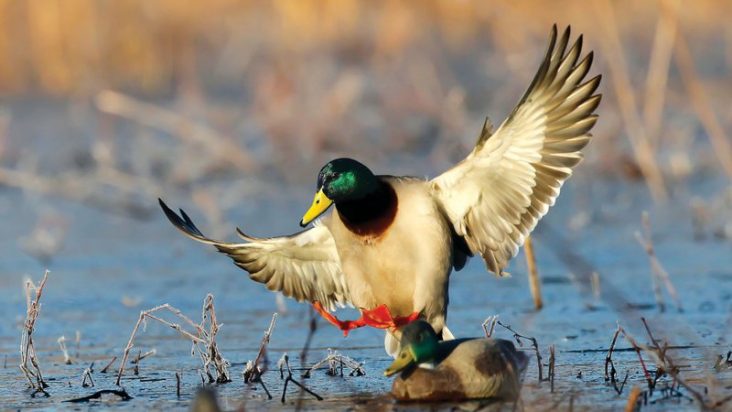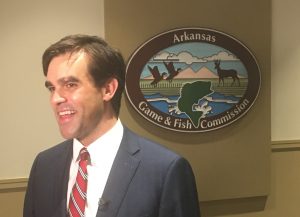Conservation is the name of the game for G&FC director Austin Booth
by November 28, 2021 9:50 am 1,124 views

Courtesy Arkansas Game & Fish Commission.
Since being selected to serve as the 19th director of the Arkansas Game & Fish Commission earlier this year, Austin Booth has been wrestling with the agency’s biggest challenge: its financial future.
Booth, an avid outdoorsman with a background in the military and governmental finance, knows the key to securing funding rests with expanding the base of supporters for the Game & Fish Commission’s mission.
“Anytime we talk about fish and game – whether that’s deer, turkey, trout, large-mouth bass – it always comes back to habitat,” Booth said.
“We want to grow all the habitat that we have, so more Arkansans from all over the state can get outside and enjoy the very best that the state has to offer. But there’s lots of people in Arkansas that don’t necessarily call themselves a hunter or an angler, but they’re a huge part of supporting conservation. We need to better meet them wherever they’re at, whether they’re paddle boarders or kayakers or mountain bikers, and we have much room to grow there going forward,” he added.
The Arkansas Game & Fish Commission’s roughly $141 million annual appropriation is predicated on license fees, federal aid, and a portion of a one-eighth cent conservation sale tax passed in 1996. The sales tax is stable, but the license fees have declined by about 16% since 2014, Booth said.
The agency manages wildlife and fisheries assets and habitat across the state including over 2.9 million acres of land on Wildlife Management Areas and cooperative agreements. It also manages 600,000 acres of lakes, 90,000 miles of rivers and streams, 382,569 acres that it owns, six fish hatcheries and net pens, 20 local and regional offices, and nine education and nature centers.

“What we need on the budget side of the house is a long-term, comprehensive vision for how the Arkansas Game & Fish Commission is going to serve Arkansans in the outdoors. Then we can talk about how we get there and how to pay for all those things,” Booth said. “I’ve articulated my vision since July 1st. One of the things that I always mention – core to my vision of common man, common woman, conservation – is the fact that we’re not just conserving fish, we’re not just conserving animals or their habitat, we’re ultimately conserving the outdoor character of our state.”
Booth said the new infrastructure funding passed by Congress, but not supported by any member of Arkansas’ delegation, may provide some relief for flooding controls, which can help with critical duck habitats in Arkansas that he says are priority No. 1.
“We hope that there will be some flood mitigation projects that we can undertake going forward… At the top of the list would be our greentree reservoirs. You know, we’ve been on the road since October talking about what we’re doing at our greentree reservoirs. They’re household names, not just in Arkansas, but throughout the entire United States. Places like Hurricane Lake Wildlife Management Area, Black River, Bayou Meto, and we have two-fold problem there. One is our infrastructure is 50 to 60 years old and it was not designed to keep up or even manage the amount of rainfall that we’ve been getting in the past few years. In addition to that, that’s led to some pretty serious forest health conditions. And those red oaks, the red oak forest, those bottomland hardwoods, are really what made Arkansas duck hunting what it’s known for today. That’s priority number one, not just because it’s a tremendous priority in the short term, but because any time we talk about forest management, it takes a very long time to fix,” he said.
You can watch Booth’s full interview in the video below.
